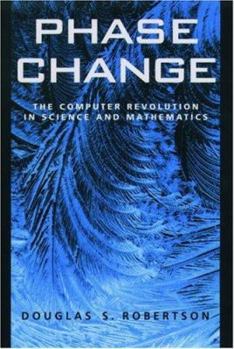Phase Change: The Computer Revolution in Science and Mathematics
Robertson's earlier work, The New Renaissance projected the likely future impact of computers in changing our culture. Phase Change builds on and deepens his assessment of the role of the computer as a tool driving profound change by examining the role of computers in changing the face of the sciences and mathematics. He shows that paradigm shifts in understanding in science have generally been triggered by the availability of new tools, allowing...
Format:Hardcover
Language:English
ISBN:0195157486
ISBN13:9780195157482
Release Date:March 2003
Publisher:Oxford University Press, USA
Length:208 Pages
Weight:0.84 lbs.
Dimensions:0.8" x 5.8" x 8.5"
Customer Reviews
3 ratings
Popularity can be inversely correlated with quality
Published by Thriftbooks.com User , 16 years ago
Don't let the low sales rank fool you. This is one of the most important books in recent years.
New ideas on the history of science
Published by Thriftbooks.com User , 20 years ago
Robertson presents an important new perspective on the history of science in this book. We all know that computers have vastly increased our ability to study the universe around us, as well as the universe of mathematics, but Robertson puts this revolution into a wider context, as part of an ongoing process that occurs whenever our ability to observe the universe increases significantly. The invention of the telescope, for example, brought about a large quantitative change in our ability to see. However, the result in astronomy is more than just quantitative, more than just the ability to see more things in the sky, but a fundamental change in the insights that are available to us in that field.Robertson's great insight in this book is that the telescope is only one example of this phenomenon in the history of science.
Read this book
Published by Thriftbooks.com User , 21 years ago
The author generalizes the meaning of "phasechange" to describe any event for which it is nearlyimpossible to forecast the behavior of a system afterthe event from a knowledge of the behavior of a systembefore the event. He points out that such events inscience and mathematics frequently involve theinvention of a technology that allows us to observesomething that could not be observed before. Hefurther argues that "phase changes" cause paradigmshifts. Examples of inventions that have caused phasechanges are the telescope in astronomy, the microscopein biology, and the computer in every field. Hisarguments are very good, and although I was skeptical,I was convinced. Even if you are not convinced by hisarguments, the book is enormously interesting for thehistory and overview it gives of mathematics,astronomy, physics, biology, and other sciences. Iwas very impressed that one person could grasp theessential features of so many different fields. Inaddition, he expresses the ideas and history so wellthat I found it enormously interesting, even in thefields I am already familiar with. Chapter 8 is more controversial, and althoughI did not agree with everything he says, I wasfascinated to read his views. I found my mind beingstretched in enjoyable ways. I highly recommend this book to anyone who haseven the slightest interest in science, and also toanyone who is interested in learning more about thecomputer revolution.





